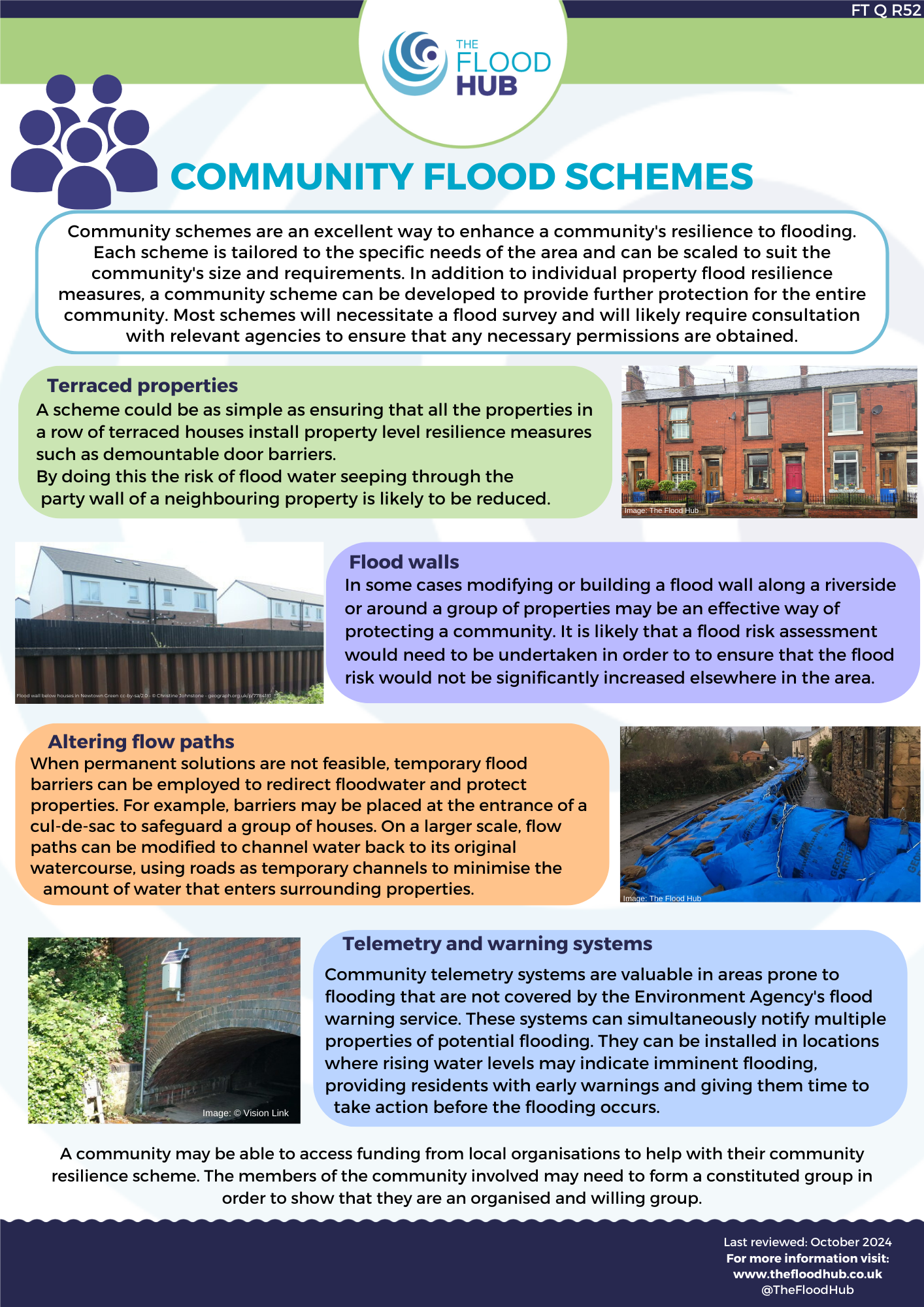Community Flood Action Groups
A flood action group is a voluntary group of local residents, who meet on a regular basis, to work on behalf of the wider community to help to try and reduce the impact of future flood events. The group can focus on emergency planning, flood resilience, warning and informing and can also tackle local issues, whilst providing a unified voice for the community to communicate ideas and queries to others.
Each group decides on its own roles, responsibilities, aims and objectives.
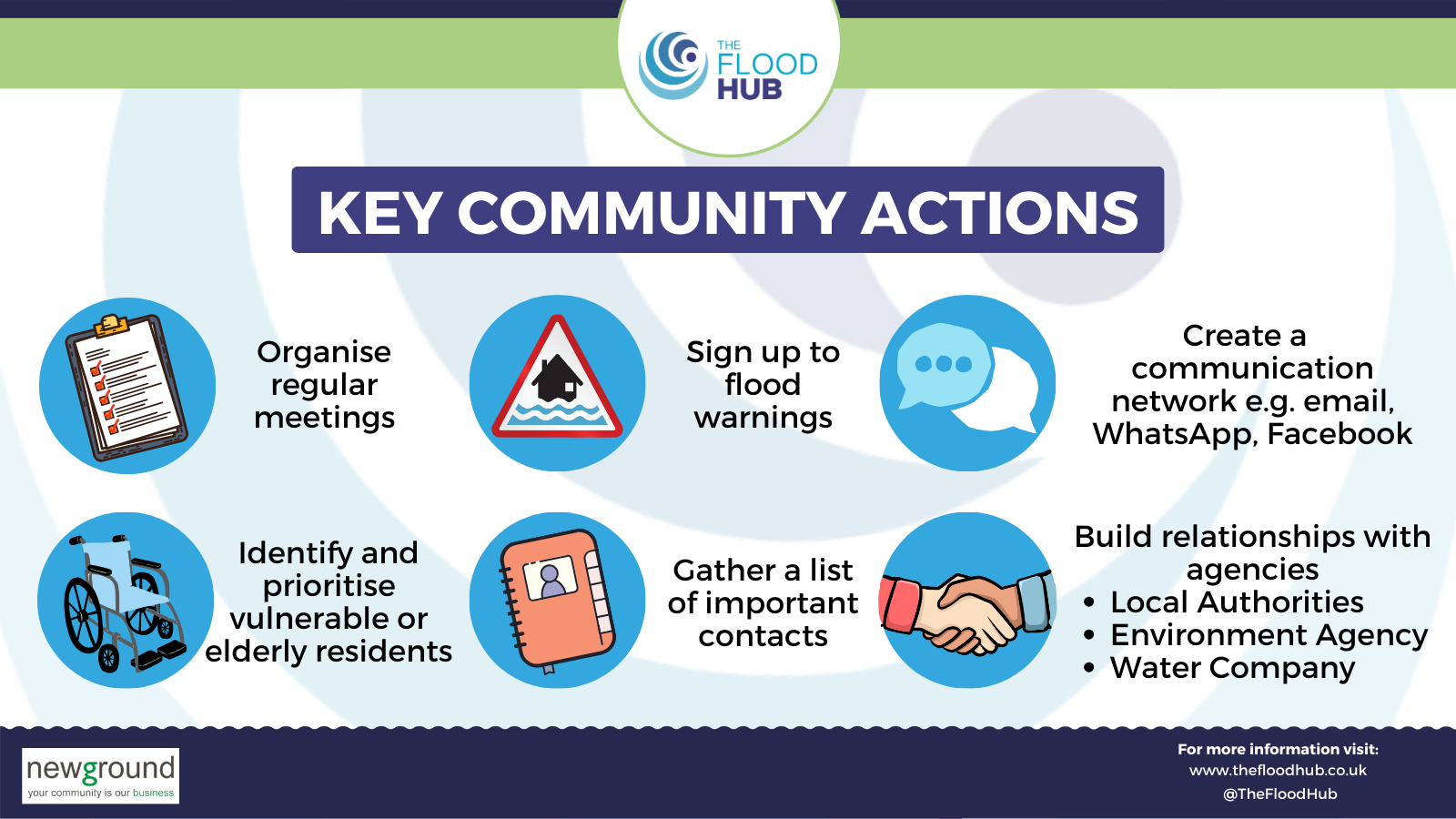
The roles of a flood action group could include:
- Spread awareness of flood risk within the community.
- Monitoring local conditions e.g. community volunteers keeping an eye out for blocked drains.
- Develop and review a community flood plan.
- Looking out for vulnerable members of the community.
- Preparing for and taking action during a flood event.
- Identifying key flooding issues within the community and establishing who is responsible. Click here to read more about who is responsible for managing flood risk.
- Build relationships and lines of communication with key agencies.
- Lobbying of decision makers and commenting on Government consultations.
- Influencing the development of future flood scheme opportunities to better manage flood risk.
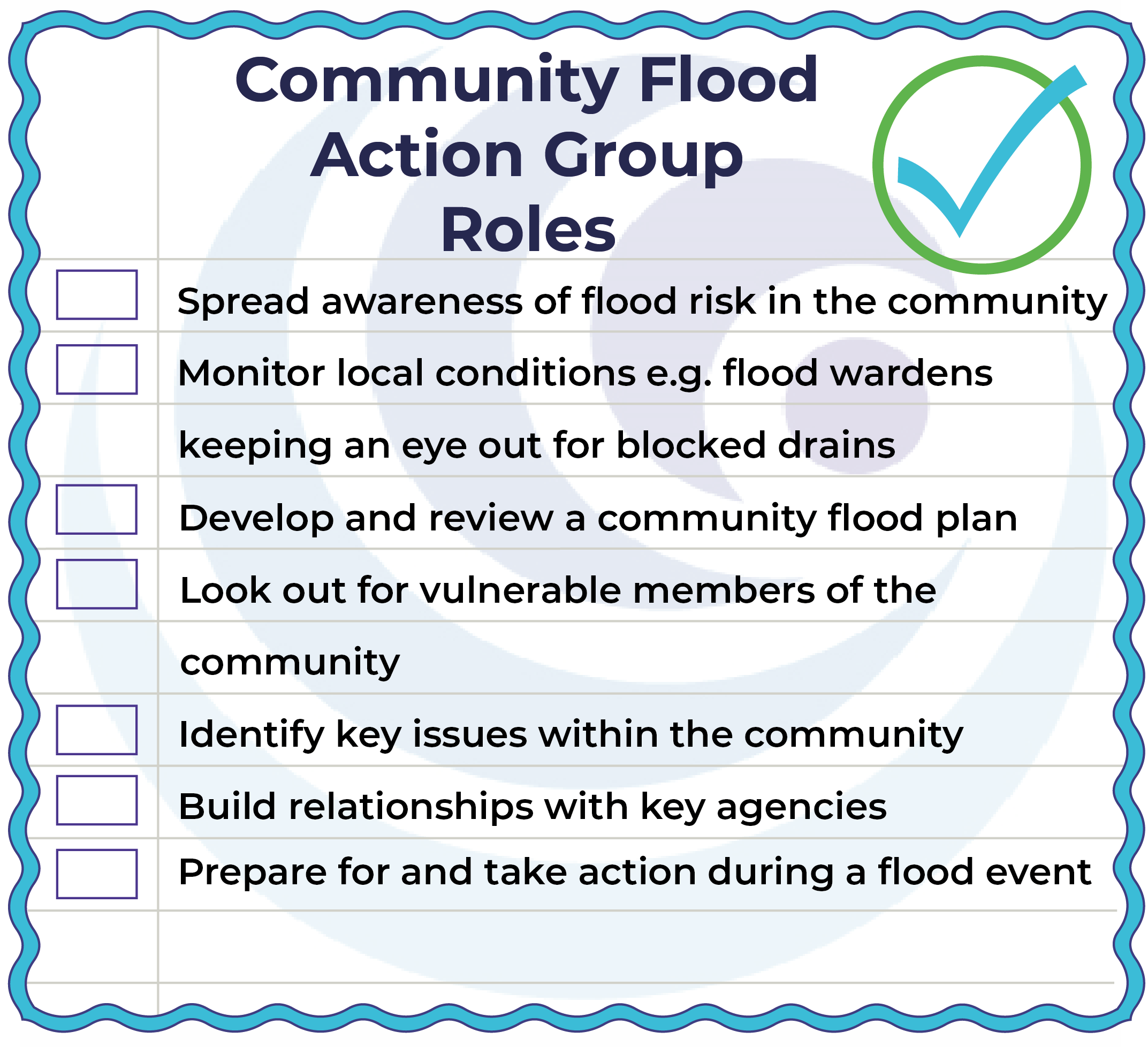
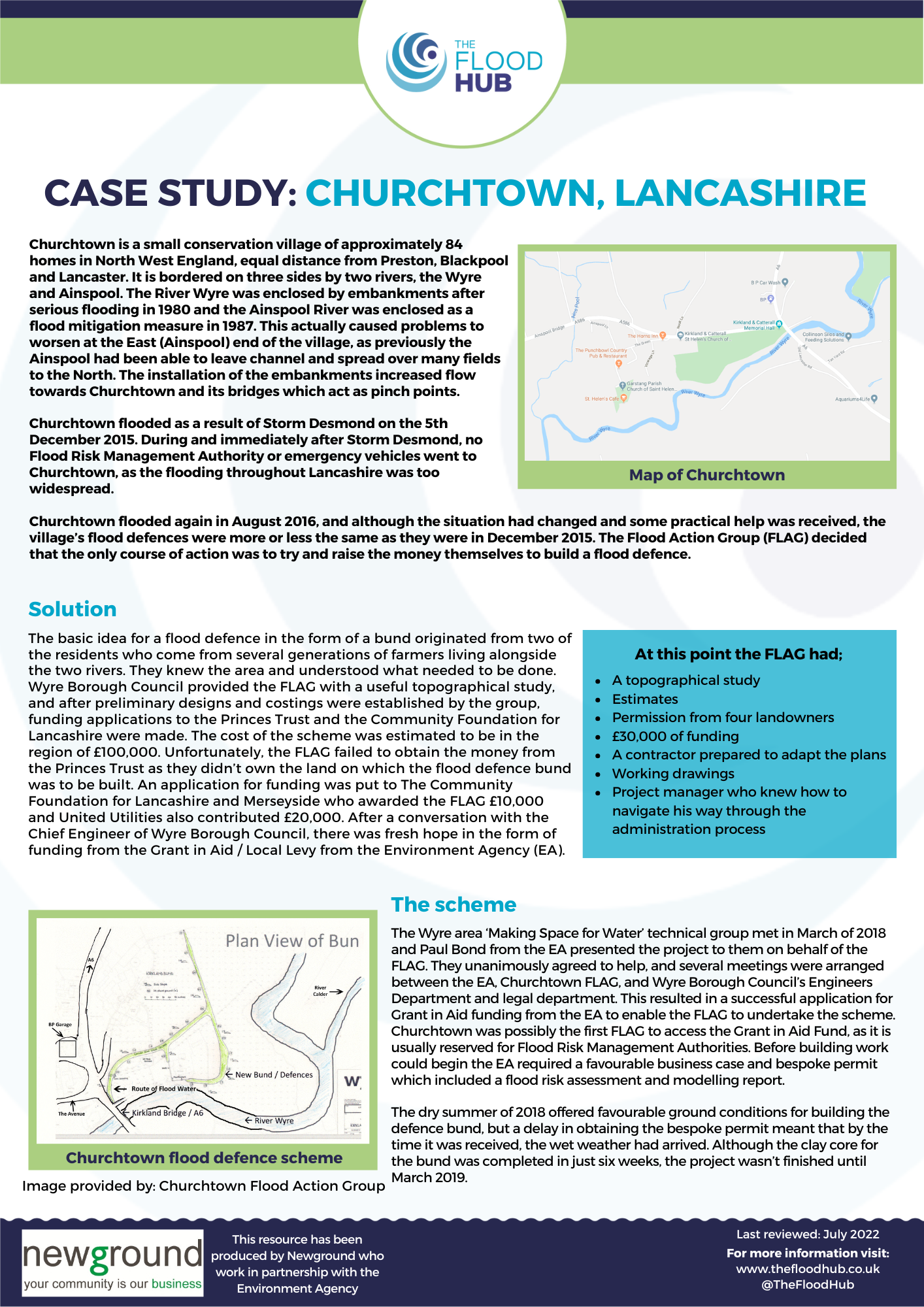
For more information, download our resource on flood action groups here.
An established group can encourage the wider community to get involved, including residents, local businesses, landowners and professional partners, as they can be important in improving flood resilience within the community. Our resource on how to reduce the impacts of flooding contains information on community flood resilience and can be downloaded here.
If your community is situated in a flood warning area, you can encourage residents and local businesses to sign up to receive flood alerts and warnings; and check out the ‘Check for Flooding’ service, , both of which are free services from the Environment Agency
Depending on the scope of the work, it could be recommended that a flood action group has public liability insurance. This may be available through your local neighbourhood watch group.
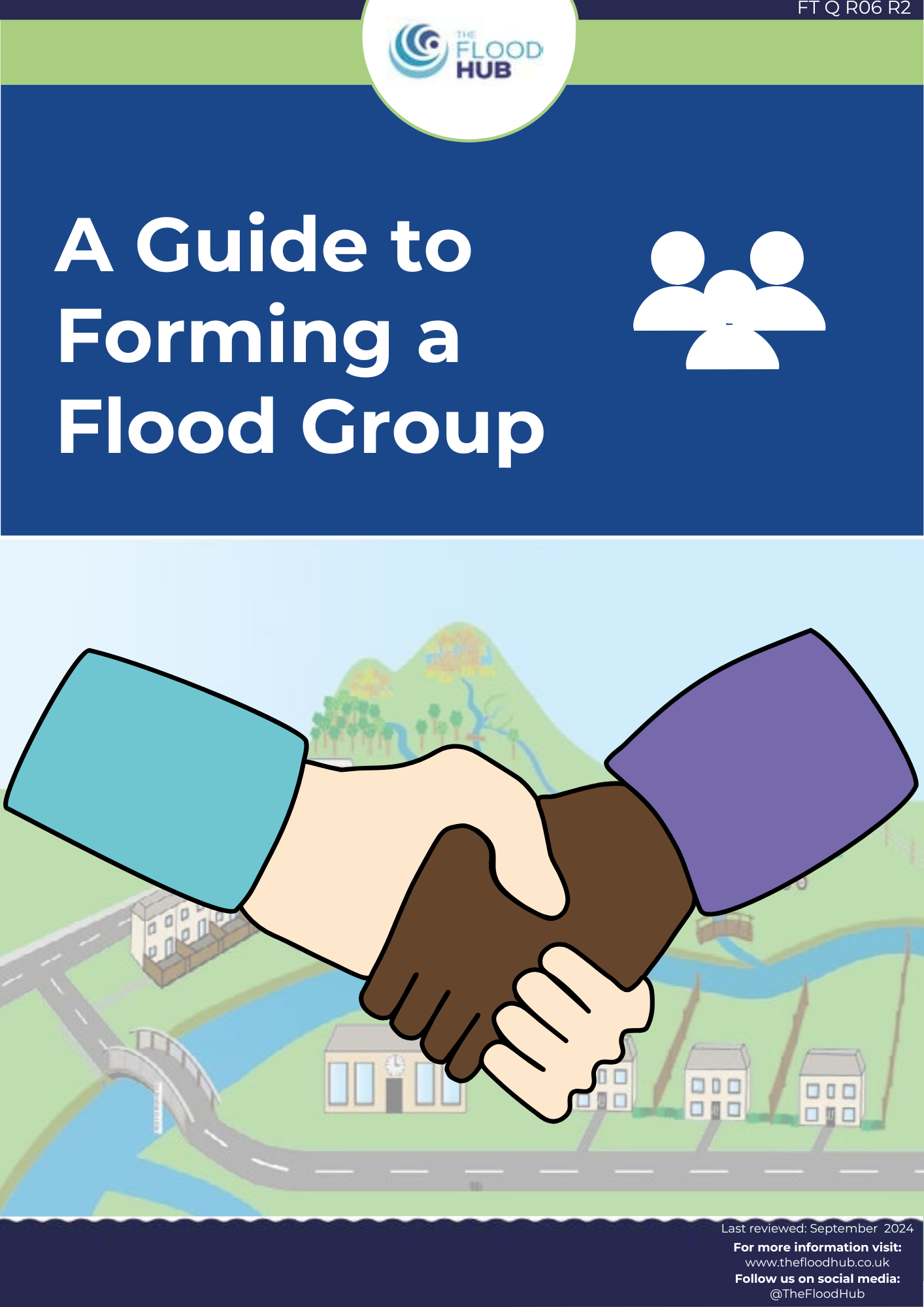
Click here to download ‘A guide to Forming a Flood Group’
Hover over each benefit below or read the text beneath the image to explore the multiple benefits of community flood groups.
Download the full resource with explanations here.
Efficient Flood Planning
Community Flood Plans outline actions to take before, during and after a flood, enabling the group to respond efficiently during flooding.
Creates Links with Agencies
Groups can form positive links with Risk Management Authorities (RMAs) and other organisations and work in partnership with them.
Strengthens Community Resilience
Groups can use their skills to focus on other emergencies or weather events which could impact the community.
Funding Opportunities
Constituted groups can access funding for equipment, which could improve community resilience.
Utilisation of Key Skills
Groups can utilise various skills and resources that different members have to help in an emergency.
Valuable Local Flood Knowledge
Communities have valuable local flood knowledge from years of living in the area that is essential for flood risk management.
Increases Awareness
Communities are more resilient working together. Groups can communicate with other residents to increase their awareness of local issues.
Influence Decision Makers
Voicing concerns as a group may have greater influence on decision makers compared to those voicing their concerns alone.
A flood event often brings attention to flood risk issues which can be localised to individuals and communities, or could affect the wider area leading to a catchment approach. Flooding issues that arise may relate to rivers or smaller watercourses, sewers and drainage, infrastructure care and maintenance, and much more. A community that has experienced flooding may be in the best position to identify problem areas, and can work with Risk Management Authorities (RMAs) to explore potential management opportunities.
Communities can work with key RMAs to manage their flood risk by forming a flood action group. A flood action group can represent the wider community, providing a single voice that engages with the RMAs to find solutions.
Community Flood Planning
Planning ahead for flooding is crucial to ensure that the community can respond efficiently in the event of an incident. By working together, you can create an action plan that ensures that when a flood alert or warning is received community members know what actions to take and enables help to be easily provided for individuals who need extra assistance.
Before engaging in community flood planning, individuals should firstly plan and prepare for flooding to their own property if it is at risk, to check your risk. It may be the case that no formal flood plan or is put in place for your community, which is why it is beneficial to plan for general resilience. For more information on how to get prepared and become more resilient, visit our Household page by or Business page by .
Community Flood Telemetry and Warning Systems
Flood telemetry systems are an automated recording and transmitting technology, designed to help communities and agencies remotely monitor sources of flood risk and receive warning triggers which can enable them to respond effectively.
They are especially useful for communities in areas which are not covered by the Environment Agency’s flood alerts and warnings. These systems can be set up in a location where a certain water level usually indicates that flooding is possible, and when triggered, will give residents a warning so they have time to take action and prepare for flooding. Some systems like rain gauges have the added bonus of being able to warn of surface water flooding which the Environment Agency is not able to monitor. You can learn more about surface water flooding on our page by clicking . See our ‘Community Flood Telemetry’ resource here for more information.
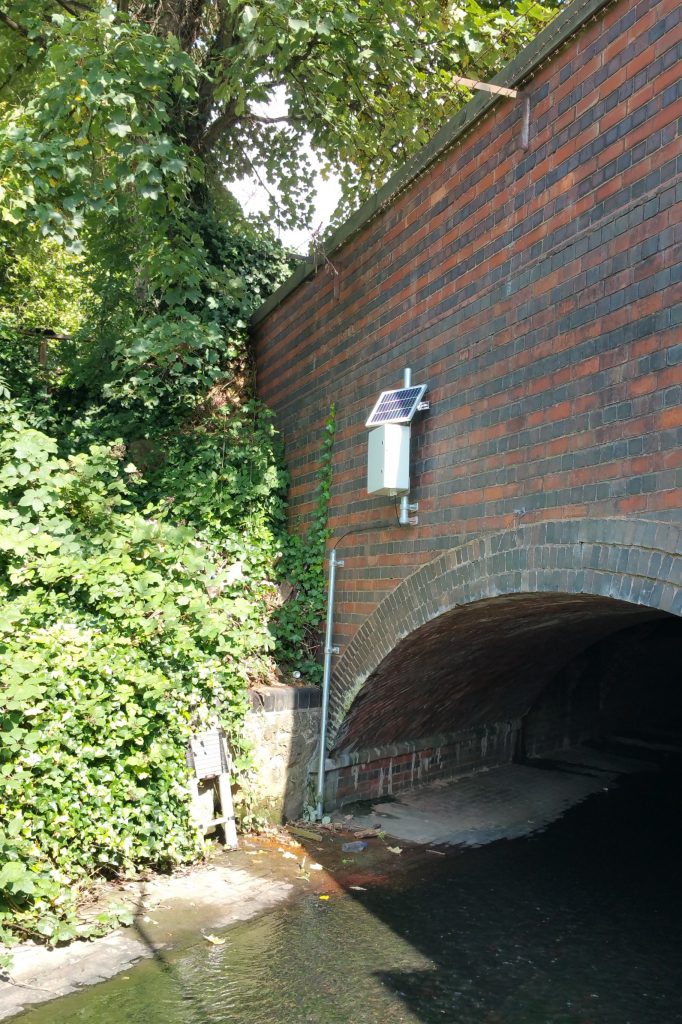
Community Flood Resilience Schemes
A community scheme increases a community’s flood resilience, tailored to suit the specific needs of the area. The size of the scheme will vary between communities, and can protect the community in different ways, from installing property flood resilience (PFR) measures to individual properties, to deploying larger defences to protect a certain area within the community.
It is a good idea to get a flood survey carried out to identify the best course of action for protection, and the range of options available to your community. You will also need to ensure that you consult the necessary agencies to obtain any permission for a scheme before it is developed, if needed.
Whether a community flood scheme is feasible or not, it is important that residents prioritise their individual household and business resilience. For more information on this, visit our Household page by or Business page by .
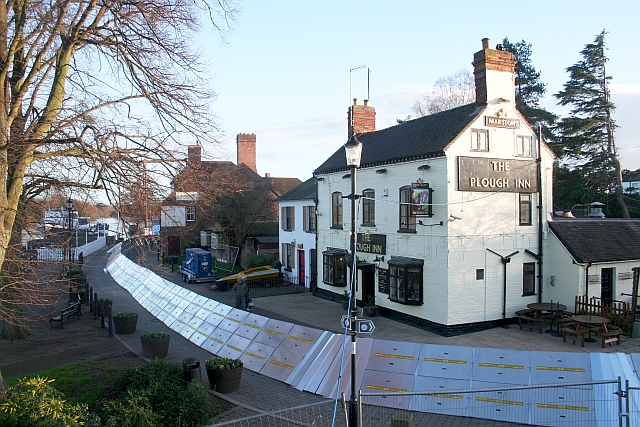
Flood Barriers at Upton cc-by-sa/2.0 – © Bob Embleton – geograph.org.uk/p/292012
It may be possible for a flood action group to access funding from local organisations to assist with community resilience. To access funding, the group may need to become a constituted group. A constitution is the ‘governing document’ of your group which sets out how you intend to run it, and shows funders that the group is organised if you are going to apply for grant funding.
Your local Council for Voluntary Service (CVS) can assist the flood action group in becoming constituted and can provide access to resources and information around running successful community groups.
Click here to download the resource below for links to some possible community funding sources.
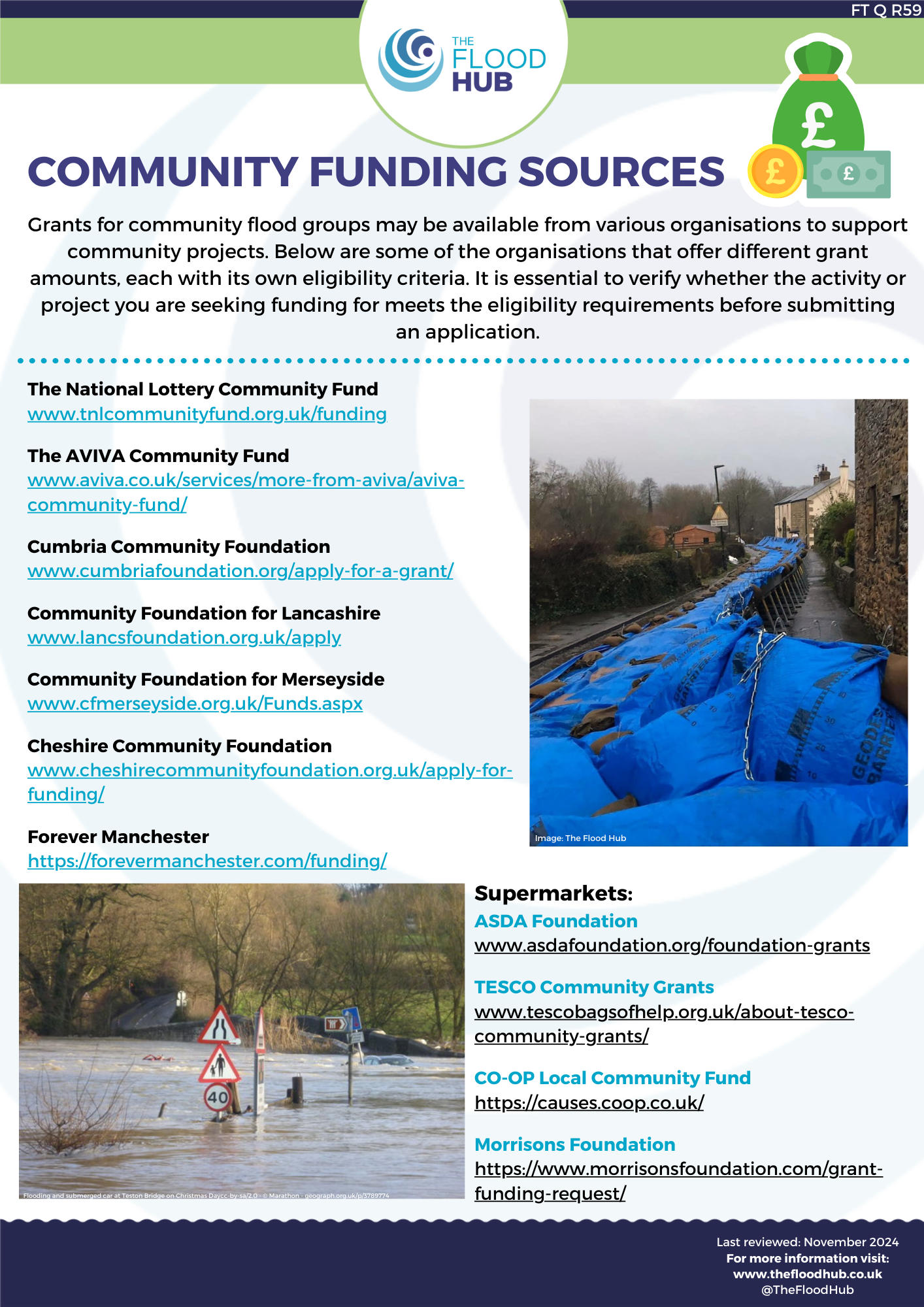
Terraced Properties
Simple schemes could ensure that all the properties in a row of terraced houses install property flood resilience measures such as demountable door barriers, read more on PFR on our page by clicking here. This will reduce the risk of floodwater seeping through the party wall from a neighbouring property. In these cases, consent will usually be needed from residents from each house to allow the scheme to go ahead.
Flood walls
Larger schemes may involve modifying or building a flood wall along a riverside or around a group of properties to protect a community. In these cases, a flood risk assessment would usually be undertaken to ensure the flood risk is not increased elsewhere.
It is worth noting that there is a flood risk activities exemption for schemes that protect up to 6 adjoining properties using raised defences up to a meter high. Read more on environmental permits and exemptions by clicking here.
Altering Flow Paths
Sometimes, permanent solutions are not appropriate, so temporary barriers can be used to redirect water away from properties, such as across a cul-de-sac entrance. At a larger scale, flow paths could be altered to redirect water back to the watercourse using roads as temporary channels.
Products
Products should be purchased from a reputable source, Know Your Flood Risk’s ‘Homeowner’s Guide to Flood Resilience’ has more information on available products, click here to read. Click here to visit the Buy with Confidence scheme website, which highlights trustworthy businesses to source products from. Click here to visit the Blue Pages website, which is a directory of flood products which gives information on available options of protection, and this Trader Directory accessible by clicking here can be used to find traders in your local region.
You can ensure the quality of any products by checking that they are Kitemark certified meaning they have been thoroughly tested in a BSI (British Standards Institution) approved testing facility and therefore have good safety, quality and reliability. The BSI Kitemark for Flood Protection products is known as PAS1188.
Click here for more guidance on checking the certification of products.
A community flood resilience scheme typically includes communal flood defence products and equipment. These should be stored in an accessible location to allow communities to respond quickly to the flooding. The flood defence products and equipment should be maintained and checked regularly as part of the flood plan to ensure it remains in working order.
Ensure that at least two individuals, ideally from properties with lower flood risk have access to the storage. This way, they can prioritise responding to the communities needs over addressing their own household or business concerns.
Our resource containing information on community flood schemes can be downloaded here.
